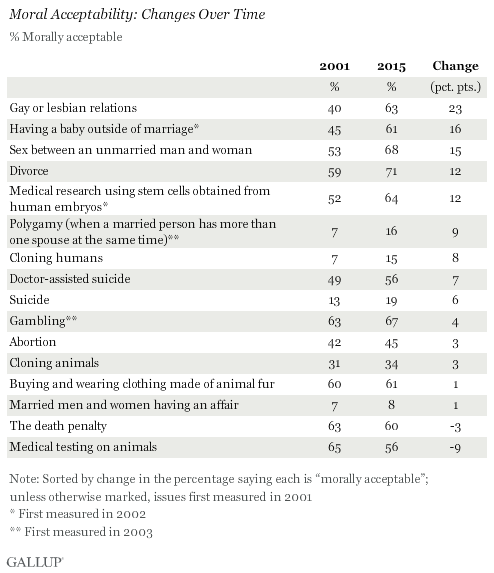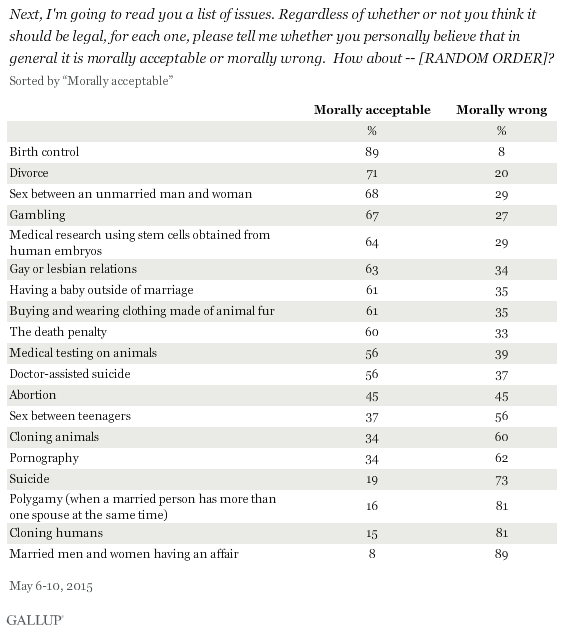Story Highlights
- Americans now more accepting of a number of moral issues
- All changes have been in more liberal direction
- Biggest shift on gay/lesbian relations
PRINCETON, N.J. -- Americans are more likely now than in the early 2000s to find a variety of behaviors morally acceptable, including gay and lesbian relations, having a baby outside of marriage and sex between an unmarried man and woman. Moral acceptability of many of these issues is now at a record-high level.

This latest update on Americans' views of the moral acceptability of various issues and behaviors is from Gallup's May 6-10 Values and Beliefs survey. The complete results for each of the 19 issues tested in this year's survey appear at the end of the article. Gallup has tracked these moral issues in this format since the early 2000s.
The upward progression in the percentage of Americans seeing these issues as morally acceptable has varied from year to year, but the overall trend clearly points toward a higher level of acceptance of a number of behaviors. In fact, the moral acceptability ratings for 10 of the issues measured since the early 2000s are at record highs.
Americans have become less likely to say that two issues are morally acceptable: the death penalty and medical testing on animals. But Americans' decreased acceptance of these practices actually moves them in a more liberal direction.
These results reflect the same type of shift evident in the public's self-reported ideology on "social issues." More Americans now rate themselves as socially liberal than at any point in Gallup's 16-year trend, and for the first time, as many say they are liberal on social issues as say they are conservative.
Key trends in Americans' views of the moral acceptability of certain issues and behaviors include the following:
- The substantial increase in Americans' views that gay and lesbian relations are morally acceptable coincide with a record-high level of support for same-sex marriage and views that being gay or lesbian is something a person is born with, rather than due to one's upbringing or environment.
- The public is now more accepting of sexual relations outside of marriage in general than at any point in the history of tracking these measures, including a 16-percentage-point increase in those saying that having a baby outside of marriage is morally acceptable, and a 15-point increase in the acceptability of sex between an unmarried man and woman. Clear majorities of Americans now say both are acceptable.
- Acceptance of divorce and human embryo medical research are also up 12 points each since 2001 and 2002, respectively.
- Polygamy and cloning humans have also seen significant upshifts in moral acceptability -- but even with these increases, the public largely perceives them as morally wrong, with only 16% and 15% of Americans, respectively, considering them morally acceptable.
Gallup will report on a number of these trends in more detail later this week.
Implications
Americans are becoming more liberal on social issues, as evidenced not only by the uptick in the percentage describing themselves as socially liberal, but also by their increasing willingness to say that a number of previously frowned-upon behaviors are morally acceptable. The biggest leftward shift over the past 14 years has been in attitudes toward gay and lesbian relations, from only a minority of Americans finding it morally acceptable to a clear majority finding it acceptable.
The moral acceptability of issues related to sexual relations has also increased, including having a baby outside of wedlock -- something that in previous eras was a social taboo. Americans are more likely to find divorce morally acceptable, and have also loosened up on their views of polygamy, although this latter behavior is still seen as acceptable by only a small minority.
This liberalization of attitudes toward moral issues is part of a complex set of factors affecting the social and cultural fabric of the U.S. Regardless of the factors causing the shifts, the trend toward a more liberal view on moral behaviors will certainly have implications for such fundamental social institutions as marriage, the environment in which children are raised and the economy. The shifts could also have a significant effect on politics, with candidates whose positioning is based on holding firm views on certain issues having to grapple with a voting population that, as a whole, is significantly less likely to agree with conservative positions than it might have been in the past.
Survey Methods
Results for this Gallup poll are based on telephone interviews conducted May 6-10, 2015, with a random sample of 1,024 adults, aged 18 and older, living in all 50 U.S. states and the District of Columbia. For results based on the total sample of national adults, the margin of sampling error is ±4 percentage points at the 95% confidence level. All reported margins of sampling error include computed design effects for weighting.
Each sample of national adults includes a minimum quota of 50% cellphone respondents and 50% landline respondents, with additional minimum quotas by time zone within region. Landline and cellular telephone numbers are selected using random-digit-dial methods.
View survey methodology, complete question responses and trends.
Learn more about how Gallup Poll Social Series works.


